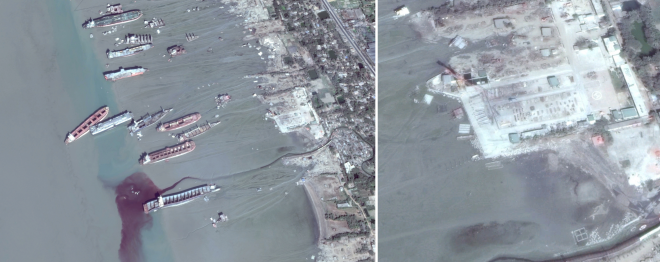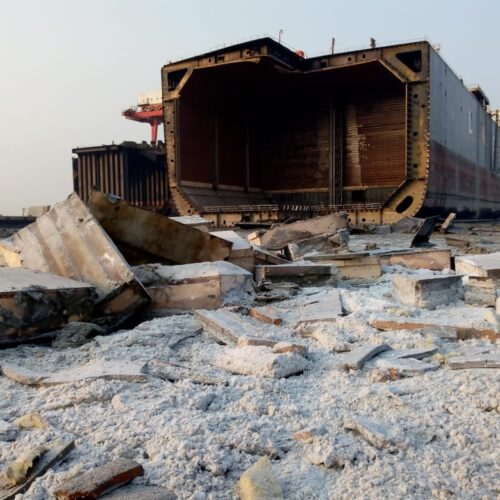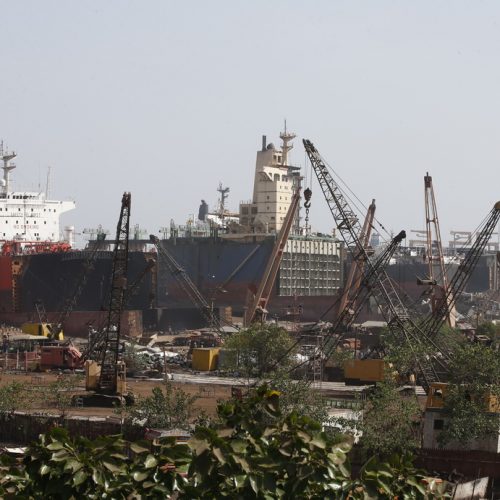Press Release – NGOs and trade unions denounce certification issued to PHP yard by classification society RINA
In October, the PHP Family (Peace Happiness and Prosperity) shipbreaking yard received a Statement of Compliance with the Hong Kong Convention [1] by the Italian classification society RINA. Trade unions in Bangladesh, as well as the Platform’s member Bangladesh Institute for Labour Studies (BILS), are concerned that such a labelling sets a dangerous precedent for the further green-washing of the Chittagong beaching yards. Workers and the environment are not protected as long as ships are broken on the beach, and as long as fundamental labour rights and proper infrastructure are not secured.
PHP is run by a renowned business family in Chittagong, who also runs activities in the steel re-rolling and construction industries, and owns TV channels. Trade unions made a formal request to represent the workers at the PHP yard, but the management has systematically rejected the workers’ right to freedom of association, and employees that have strongly engaged in demanding respect of workers’ rights have even been fired. Any worker association or NGO which does not praise PHP is received with hostility and is not even allowed to visit the yard. As reported yesterday by the Platform, accidents at the PHP shipbreaking yard continue to happen.
“It is shocking that a company that rejects legitimate trade union activities can be stamped as operating in line with international laws”, says Nazim Uddin, local trade union leader and Bangladesh representative at IndustriALL.
Despite some investments in the PHP yard to concrete parts of the upper beach, the severe deficiencies in infrastructure for the containment of toxics renders any statement of compliance with pollution prevention standards ludicrous. When vessels are cut in the intertidal zone, toxics are inevitably released in the sea. The entire Chittagong area is heavily polluted, and there is no means for any beaching yard to handle and dispose hazardous waste, such as oil residues, heavy metals and asbestos, in a safe and environmentally sound manner. The Hong Kong Convention’s ship recycling requirements stop at the gate of the yard, therefore the fact that Bangladesh still has no waste treatment facility for general waste, let alone for the toxic materials coming from ships, is completely overlooked by the Convention. Statements of Compliance with the Hong Kong Convention are clearly no guarantee that the environment and workers are protected from the many risks connected to the heavy and hazardous industry of ship recycling.
“That a beaching yard in Chittagong is able to comply with the Hong Kong Convention tells us a lot about the extremely low standard set by the International Maritime Organisation”, said Ingvild Jenssen, Director and Founder of the NGO Shipbreaking Platform. “Any ship owner looking for a safe and clean location for the recycling of their ship will be wise to disregard the very misleading Statements of Compliance with the Hong Kong Convention, and instead consult the upcoming EU List of approved ship recycling facilities”, she adds.

* Updated on 26 January 2018 – Quote by Nazim Uddin changed following his request
NOTE
[1] Statements of Compliance with the Hong Kong Convention were first issued to beaching yards by the Japanese company Class NK in Alang, India, last year. Other classification societies, such as RINA and the Indian Ship Registry, have now entered the business of issuing these statements, and a total of 47 yards have received such statements in India, whilst PHP is the first, and so far, the only one in Bangladesh.
Related news

Platform publishes South Asia Quarterly Update #37
Eight workers suffered an accident on South Asian beaches in the first quarter of 2024.
... Read More
Platform publishes South Asia Quarterly Update #26
Eleven workers suffered an accident on South Asian beaches in the second quarter of 2021.
... Read More
Press Release – Toxic aircraft carrier dangerously drifting after weeks at sea
The toxic waste-laden aircraft carrier São Paulo is still drifting more than 12 miles off the coast of the State of Pernambuco.
... Read More
Press Release – The Hong Kong Convention provides no roadmap for sustainable ship recycling
Today, the Hong Kong International Convention for the Safe and Environmentally Sound Recycling of Ships (HKC) officially enters into force.
... Read More
Press Release – Platform publishes list of ships dismantled worldwide in 2021
763 ocean-going commercial ships and floating offshore units were sold to the scrap yards in 2021. Of these, 583 ended up on the beaches of South Asia, amounting to near the totality of the gross tonnage dismantled globally.
... Read More
Platform News– Legal action taken by family of deceased worker following fatal incident at IŞIKSAN ship recycling yard in Turkiye
On 31 August last year, a fatal accident occurred during the dismantling of the Norwegian floating oil platform BIDEFORD DOLPHIN at the IŞIKSAN ship recycling yard in… Read More


